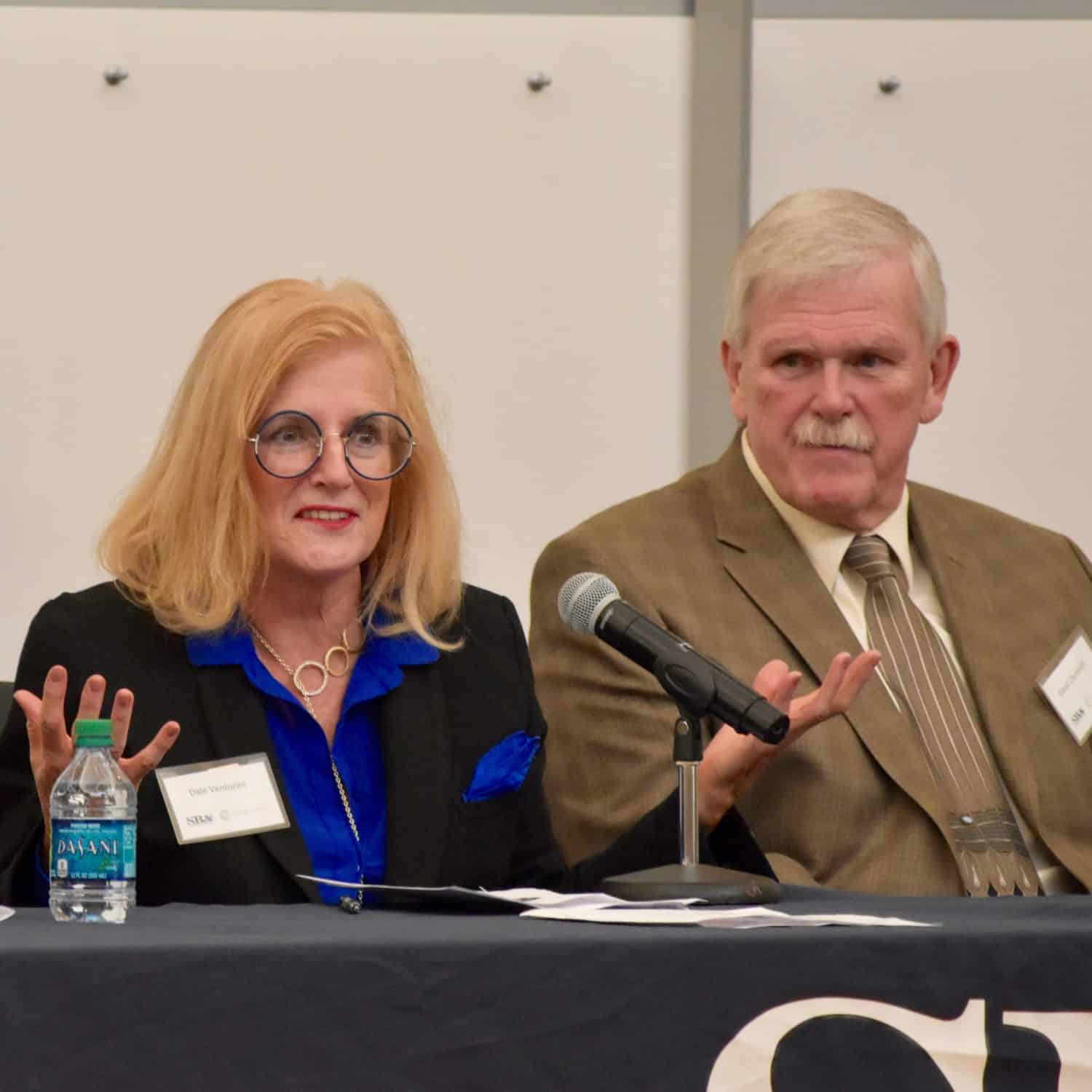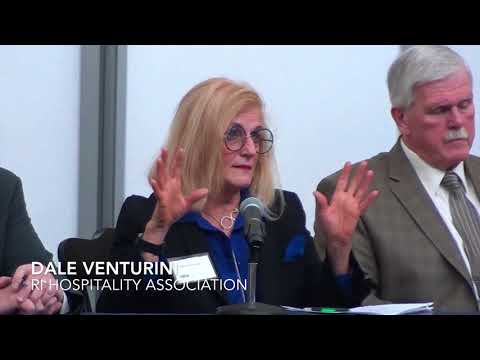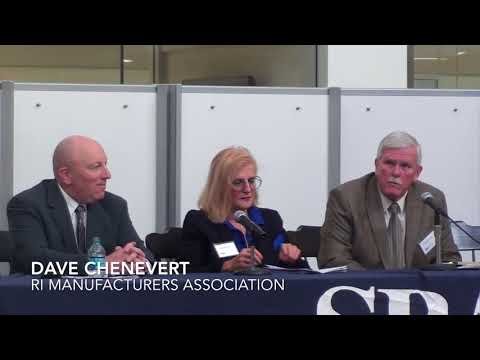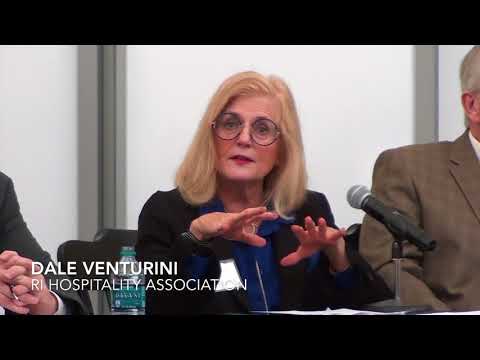Small Business Economic Summit recycles long debunked minimum wage myths
At the 2018 Rhode Island Small Business Economic Summit, held at Bryant University on Tuesday morning, Dale Venturini, President and CEO of the Rhode Island Hospitality Association was asked about the use of robots in her industry as a result of the pressure of an encroaching $15 minimum wage. “I’m more concerned about all the stories out there, you know,
January 17, 2018, 11:34 am
By Steve Ahlquist
At the 2018 Rhode Island Small Business Economic Summit, held at Bryant University on Tuesday morning, Dale Venturini, President and CEO of the Rhode Island Hospitality Association was asked about the use of robots in her industry as a result of the pressure of an encroaching $15 minimum wage.
“I’m more concerned about all the stories out there, you know, the old ‘fake news’ about ‘this is going to happen, that’s going to happen, this is going to happen,'” began Venturini, “I happen to work for a very resilient industry. They’re going to figure it out, if they can. Only if they can, honestly, because I’ve already seen a few changes [that] people are making.
“You know, when somebody says they’re going to go robotics- I’m in an industry that’s high touch and high tech. Yeah, we’ll find some types of things we can use technology for, but… I don’t know the answer to that.”
Venturini is “considered by many to be the voice of the [hospitality] industry in Rhode Island” says the bio provided by the Summit. Her uncertainty about the use of robotics as as solution to high wages is telling: A “high-touch” industry requires human interaction. (An example of a “low-touch” service might be a vending machine.)
That said, Venturini is certainly not championing minimum wage increases. “Everyone is impacted by wage increases. It doesn’t matter what industry it is because it’s not the wage increase, it’s what happens after the fact,” said Venturini. “Because once you bring somebody a certain wage, anybody earning that wage would want the same [increase]. It’s all about how much money you have and how much you can pass onto the customer.”
David Chenevert, Executive Director of the Rhode Island Manufacturers Association, was on the panel with Venturini. Chenevert, a strong supporter of Invenergy‘s plans to build a $1 billion fracked gas and diesel oil burning power plant in the forests of northwest Rhode Island, was not adverse to spreading long discredited misinformation about the minimum wage. In response to Chenevert, I’ve counterpoised quotes from FDR, the President who helped establish the minimum wage back in 1938.
“I can remember when minimum wage [was] $1.60 an hour and I was thrilled because I could fill my gas tank,” said Chenevert. “The minimum wage then was looked on as a subsidy. Older gentlemen would work and use that for their vacation, plus they had a regular job. Today, we’re trying to get minimum wage be a way to make a living.”
The lie that the minimum wage was never intended to be a living wage is easily debunked. When the minimum wage was first introduced in 1933 by FDR, it was clearly meant to be a living wage.
“No business which depends for existence on paying less than living wages to its workers has any right to continue in this country.” (FDR, 1933, Statement on National Industrial Recovery Act)
FDR also said, “By living wages, I mean more than a bare subsistence level — I mean the wages of a decent living.” (1933, Statement on National Industrial Recovery Act)
“I’m not knocking it. I think everyone should have a living,” continued Chenevert. “But what I really think we should do is get to the point where we’re educating them to get a better job, more than just give them and throw money at them.”
This is more nonsense. Taking a low-wage McDonald’s employee and training her to be a manufacturing equipment operator will certainly help lift her family out of poverty, but McDonald’s will simply hire another low-wage worker to replace her on the hamburger assembly line. There will still be workers and families struggling in poverty, exploited by low wages.
“All but the hopelessly reactionary will agree that to conserve our primary resources of man power, government must have some control over maximum hours, minimum wages, the evil of child labor and the exploitation of unorganized labor.” (FDR, 1937, Message to Congress upon introduction of the Fair Labor Standards Act)
“… to hit them with a $3 or $4 increase, [moving] the minimum wage to $15, I think you’re going to put some companies right out of business,” said Chenevert. “They have a tough time now. They have their houses on the line to support their business. They’re using their line of credit, using their credit cards, and if we go forward with that kind of increase in the minimum wage, you’re really going to hurt the businesses.”
“Do not let any calamity-howling executive with an income of $1,000 a day, who has been turning his employees over to the Government relief rolls in order to preserve his company’s undistributed reserves, tell you – using his stockholders’ money to pay the postage for his personal opinions — tell you that a wage of $11.00 a week is going to have a disastrous effect on all American industry.” (FDR, 1938, Fireside Chat, the night before signing the Fair Labor Standards Act that instituted the federal minimum wage)
Chenevert ended his lecture on increasing the minimum wage by suggesting that the government use the money that would go towards increasing the minimum wage and put it towards workforce development. The problem with Chenevert’s idea is that government doesn’t pay the difference in minimum wage, industry does. The only way government could redirect money intended for a wage increase to workforce training is by taking that money from industry in the form of higher taxes or other payments and using that money to pay for workforce training.
Surely Chenevert wasn’t suggesting that…
“I’m so happy to be here because I work for an industry where work is work and play is play and sometimes you can’t tell the difference,” said Dale Venturini ahead of her presentation on the hospitality industry to the attendees of the 2018 Rhode Island Small Business Economic Summit. “You know the problem with that is we’re a 24/7 industry.”
Venturini’s presentation depended largely on national statistics supplied by the National Restaurant Association, the American Hotel and Lodging Association, Commerce Rhode Island, the United States Department of Labor and the Rhode Island Department of Labor and Training.
Here’s the full video, followed by some notes:
There are 2798 reading and drinking places and 170 hotel properties in Rhode Island. 90 percent of the restaurants have fewer than 50 employees. The industry employs 80 thousand Rhode Islanders. “Half of United States restaurants are owned or co-owned by women and 40 percent are majority owned by minorities,” said Venturini. One third of the workers in the hospitality industry find their first job there, and half stay in the industry for life.
“Our industry has a lot of facets to it, so as a result people can be trained in many many disciplines and take that with them wherever they go,” said Venturini. “The interesting part about our industry is that we have a lot of people who work in other industries and then work for us part time, because they can earn some good money, particularly if they’re working on nights and weekends.”
Competition from Airbnb, food trucks and third party food delivery systems are seen as challenges. The cost of workforce training, access to capital, high taxes and government regulations are considered large problems.
“How about if you put in a regulation you take two away?” suggested Venturini.
Then again, not all regulations are bad: Regulations that protect existing businesses from new ideas and new competition are okay. Venturini praised new taxes imposed on Airbnbs by Governor Gina Raimondo in her budget two years ago.
UpriseRI is entirely supported by donations and advertising. Every little bit helps:
![]()









